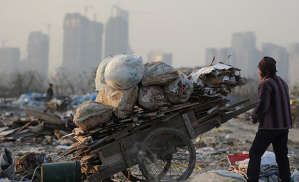
The British anti-poverty charity Oxfam released a report that claimed that the world's richest 1 percent would soon own more wealth in the world than the other 99 percent by 2016.
According to Kim Hjelmgaard of USA Today, the study, which was published in advance of the annual World Economic Forum in Davos, Switzerland, the gap between the rich and poor of the world will widen. That difference in the income pile would be over 50 percent of total global wealth, compared to 48 percent in 2014.
"In 2014, the 80 richest people had a collective wealth of $1.9 trillion - a rise of $600 billion, or 50 percent in four years," Hjelmgaard wrote. "The report used data taken from Forbes' billionaires list and also research conducted by Swiss financial services group Credit Suisse."
According to USA Today, Oxfam Executive Director Winnie Byanyima, a co-chair at this year's World Economic Forum meeting, could call for "urgent action" to tackle inequality, which could start with cracking down on corporations and rich individuals who dodge taxes.
"Do we really want to live in a world where the 1 percent own more than the rest of us combined?" Byanyima said. "The scale of global inequality is quite simply staggering and despite the issue shooting up the global agenda, the gap between the richest and the rest is widening fast."
Byanima added that the failure to take on inequality will make it worse for those who live in poverty, setting back efforts to end it for "decades."
"The poor are hurt twice by rising inequality - they get a smaller share of the economic pie and because extreme inequality hurts growth, there is less pie to be shared around," she said.
The report, entitled Wealth: Having it all and Wanting More, noted that global wealth is increasingly becoming "concentrated among a small wealthy elite." It elaborated on how wide the gap is now.
"The wealth of these 80 individuals is now the same as that owned by the bottom 50 percent of the global population, such that 3.5 billion people share between them the same amount of wealth as that of these extremely wealthy 80 people," Oxfam wrote in its report.
The report also stated that the "wealth of everyone else" failed to increase at the same rate for the richest 80 people, resulting in the wide gap between rich and poor.
"As a result, the number of billionaires who have the same amount of wealth as that of the bottom half of the planet has declined rapidly over the past five years," Oxfam stated. "In 2010, it took 388 billionaires to equal the wealth of the bottom half of the world's population; by 2014, the figure had fallen to just 80 billionaires."
As for the demographic makeup of these billionaires, Oxfam noted that this special group, comprised mostly of aging, gray-haired men, was "far from being globally representative."
"Almost 30 percent of them are citizens of the USA," Oxfam wrote. "Over one-third of billionaires started from a position of wealth, with 34 percent of them having inherited some or all of their riches."
Oxfam added that the one of economic sectors that helped 20 percent of billionaires accumulate their wealth included interest or activities in or related to the financial and insurance sector. The other sector, according to Oxfam, was in pharmaceutical and healthcare.
However, Oxfam came up with several ways to combat rising inequality. According to its report, the solutions included making governments work for citizens, promoting women's rights and economic equality, paying workers a living wage, setting caps on "skyrocketing" executive pay, setting up universal "social protections" such as unemployment benefits and pensions, and resorting to a "global wealth tax."







